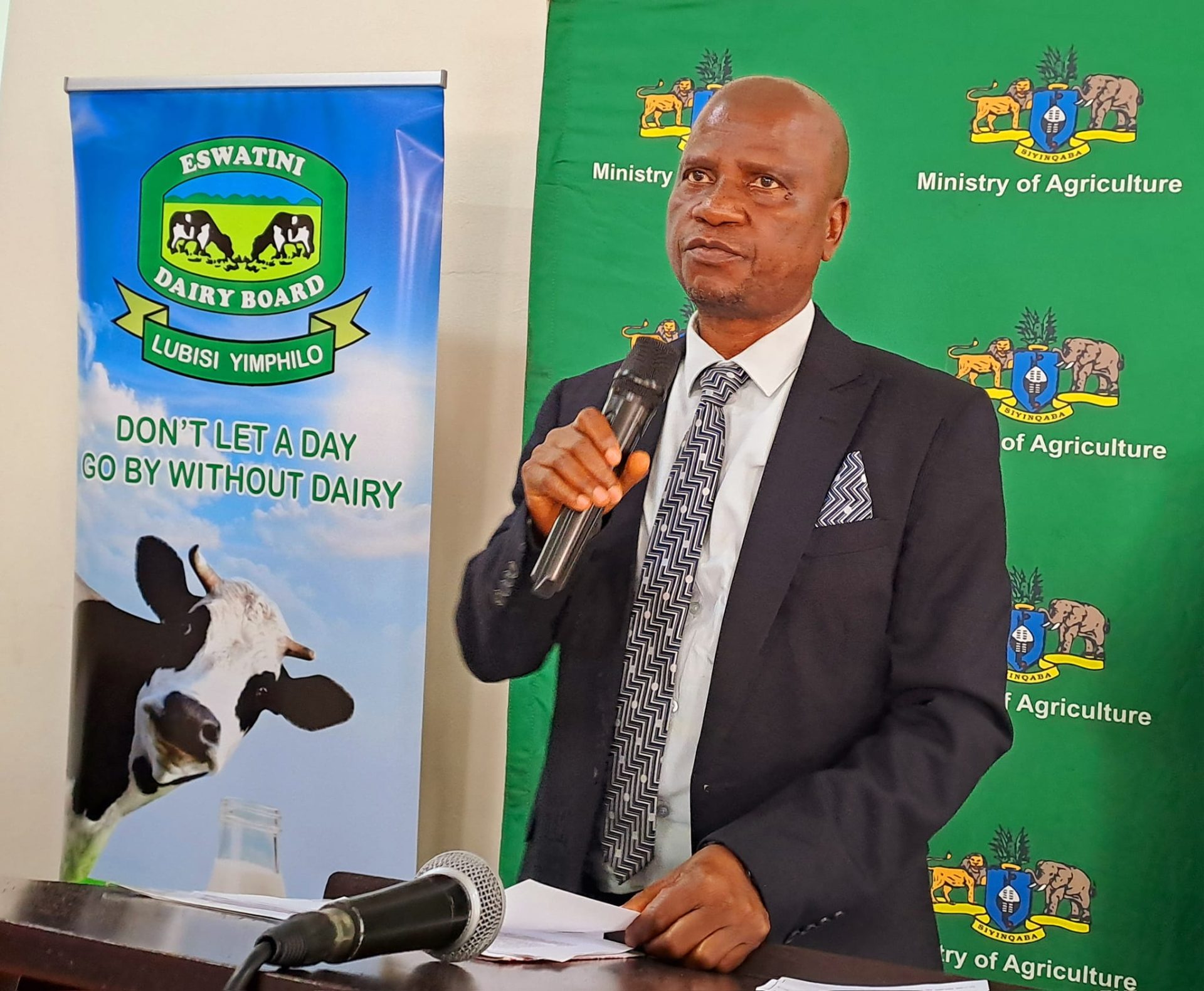By Ncaba Ntshakala
During the Eswatini Dairy Board graduation ceremony held at Tums George Hotel last Friday, Minister of Agriculture Mandla Tshawuka lauded the dedication and hard work of the graduates who completed intensive training programs in dairy cattle management,
dairy processing, and artificial insemination. Minister Tshawuka emphasized the significance of these programs in enhancing the agribusiness sector and commended the graduates for their commitment to self-improvement and agri-preneurship.
“It gives me great pleasure to be part of this graduation ceremony and even greater pleasure to be in the midst of committed agribusiness people who have shown dedication by enrolling and completing the intensive training programs provided by the Dairy Board,” stated Tshawuka.
He acknowledged the critical role that knowledge and skills play in the success of any business endeavour, particularly in agriculture.
The Minister outlined the Ministry of Agriculture’s forthcoming strategy, which centres on three pillars: Service Delivery and Decentralization, Food Sovereignty, and Wealth Creation.
He praised the Eswatini Dairy Board for its exemplary demonstration of service delivery and its alignment with the national mandate of ending hunger and poverty as articulated by His Majesty King Mswati III.
Tshawuka highlighted the positive feedback from the graduates, which he attributed to the Board’s effective training and support.
ALSO READ: SEM Cares Foundation calling out…
The Minister addressed the pressing issue of food sovereignty and noted the country’s reliance on imported milk and dairy products, with a staggering 72% of these goods currently sourced from abroad.
He highlighted the underutilization of the nation’s three dairy processing plants due to insufficient milk production.
“This represents millions of Emalangeni that accrue to outsiders but actually belong to emaSwati,” he remarked.
Tshawuka urged a collective effort to address the low numbers of dairy cattle in Eswatini, emphasizing the potential of artificial insemination to enhance herd quality and productivity.

He recognized the limitations of in-country breeding and stressed the importance of importing live dairy animals to rapidly increase the cattle population.
Tshawuka shared promising developments from a recent visit to Morocco, where Botswana’s success in developing a Foot-and-Mouth Disease (FMD) vaccine offers a potential solution for Eswatini.
He revealed that discussions at a recent SADC summit confirmed the feasibility of importing dairy animals within the framework of existing regional legislation.
The Minister of Agriculture emphasized the government’s dedication to equipping emaSwati with essential skills for food production and ensuring accessibility to income-generating projects.
He encouraged the graduates to pursue business opportunities within the dairy industry, contributing to the national goals of food sovereignty and wealth creation.
Tshawuka called on business partners to support these initiatives and help drive the nation’s economic growth.
When highlighting the vast potential of the dairy industry value chain, Tshawuka expressed the opportunities for both backward and forward integration.
ALSO READ: Lukhele Mobile supports SEM Cares…
He encouraged farmers to cultivate specialized fodder crops such as lucerne and yellow maize, which are vital for dairy cattle nutrition.
Additionally, he emphasized the importance of value addition in dairy processing to produce a variety of products and tap into export markets, thereby bringing foreign currency into the country.
“The dairy industry value chain has a huge potential for development with various business opportunities in both backward and forward integration,” he stated.
“The cattle need special fodder like lucerne and yellow maize to thrive. Farmers can grow this and sell it to cattle owners (backward integration).
Milk can be processed into many products and added into a lot of foodstuffs.”
Moreover, Minister Mandla Tshawuka announced an upcoming outreach program titled “Taking the Ministry to the People,” aimed at engaging farmers and communities across the Tinkhundla centres.
These gatherings will facilitate discussions on various agricultural issues, including service delivery. Tshawuka invited all farmers to participate in the next session at Mkhiweni on June 28.
The Minister’s closing remarks encapsulated the Ministry’s mission; ” sitse nkwe sicedza indlala nebusweti eveni, siletsa lusito Emaswatini, siletse inkhululeko kutekudla siphindze sakha ingcebo yeMaswati.”


